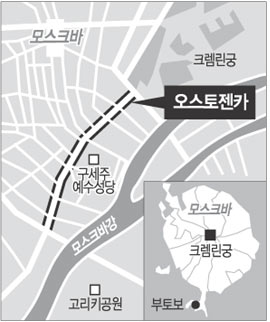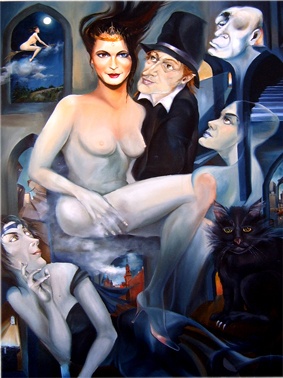최근에 읽은 러시아 관련 외신들 대부분이 부정적이거나 불길한 내용을 담고 있다. 러시아가 자원강국으로 부상하면서 새로운 '제국'의 면모를 되찾아가는 이면에서 푸틴을 권력의 정점으로 한 구 KGB 파벌의 득세와 새로운 지배층으로 등장한 관료-과두부유층 집단(올리가르히)의 전횡이 갈수록 심화되고 있다는 인상을 받는다. 러시아에서 사업을 하는 한 친구의 말을 빌면, 러시아는 소비에트 사회주의 시절을 포함하여 현재까지도 여전히 '귀족사회'인 모양이다.
자본주의의 '약한 고리'로서 사회주의 혁명이 일어날 수밖에 없었던 필연은 동시대 러시아의 여러 징후들 속에서도 감지된다. 모스크바의 오스토젠카 구역에서 벌어지고 있다는 새로운(?) '계급전쟁'(이미 '계급투쟁'이 아니다!)은 한갓 에피소드일까(우리의 '철거민 전쟁'과도 무관하지 않은 에피소드이다. 차이라면 러시아에서는 법적인 권리조차도 보호받지 못한다는 것). 외신을 요약하고 있는 국내기사와 인터내셔널헤럴드트리뷴의 원기사를 옮겨놓는다.
경향신문(06. 12. 20) 러시아 모스크바 원주민-신흥갑부 ‘계급전쟁’
러시아 수도 모스크바의 크렘린궁 인근 오스토젠카구에는 ‘공산당 선언’을 쓴 프리드리히 엥겔스의 동상이 서 있다. 요즘 이 동상 주변으로 이곳 주민들이 몰려들고 있다. 시당국이 부자들을 위해 재개발을 추진하는 바람에 이곳에서 나고 자란 원주민들이 이주 보따리를 싸야 할 위기에 몰렸기 때문이다. 15년전만 해도 공산주의의 중심이었던 모스크바의 도심에서 원주민과 신흥 부자들 사이에 새로운 계급갈등이 빚어지고 있는 것이다.

모스크바 서쪽지역 오스토젠카구 히코프로 3가에 사는 주민들은 지난 9월부터 엥겔스 동상 앞에서 항의 집회를 열고 있다. 지난 5월 시 당국이 부유층들을 위한 최고급 주거지역을 짓기 위해 낡은 아파트를 철거하겠다고 발표한 데 따른 것이다. 당국이 모스크바 남쪽 외곽 부토보에 이주용 아파트를 제공하겠다고 밝혔지만 주민 반발을 무마하지 못했다. 부토보가 모스크바에서 지하철로 1시간이나 떨어진 데다 1930년대 말 스탈린 시절 1천만명의 유대인들과 한인들이 학살돼 묻힌 곳이기 때문이다.
오스토젠카는 모스크바강이 한눈에 내려다보이는 전망 좋은 곳으로 예술가와 지식인들의 주거지였다. 지금 이곳에는 국제유가 상승으로 떼돈을 번 신흥 갑부들의 자금과 낡고 우중충한 건물을 대신해 최신식 건물을 들이겠다는 시 당국의 의지가 맞물려 수백만달러짜리 펜트하우스들이 속속 들어서고 있다. 오스토젠카 외에도 트베르스카야 등 도시 서쪽지역에는 ‘골든 마일’ 재개발 사업이 진행중이다.

신흥 갑부들을 위한 아파트는 철통 보안과 각종 편의시설을 자랑한다. 아파트값은 ㎡당 1만달러(평당 약 3천만원)가 넘어서는데도 없어서 못팔 정도다. 부동산업자인 게오르기 자구로프는 “돈과 권력이 있는 인물들은 모두 이 지역 부동산을 매입하고 있다”며 “신흥 부자들에게 1백만~2백만달러는 돈도 아니다”라고 말했다. 러시아 부자들에게 ‘사적인 것’이 ‘사회적인 것’에 절대 우위를 차지한다.
재개발 붐은 러시아 부동산업자들에게 큰 돈벌이 기회가 되고 있다. 부동산 개발회사 RGI 인터내셔널은 이달초 런던 증권거래소에 상장했다. 미국계 투자은행 모건스탠리도 지난 10월 RGI인터내셔널 주식을 대거 사들였다. 그러나 이곳 주민들은 언제 쫓겨날지 모르는 공포감에 시달린다. 오스토젠카에 사는 주민들은 당국과 개발업자들로부터 집을 비우라는 유·무형의 압력을 받고 있다.
최근 러시아 경제신문 코메르산트가 연방 반독점 감독원이 킬코프 페레록 3가 개발 사업을 불법으로 간주하고 있다고 폭로했지만 개발은 중단되지 않았다. 모스크바시 관계자는 오스토젠카의 항의는 ‘지역 이기주의일 뿐’이라고 일축했다. 모스크바 소시민들의 상대적 박탈감은 커가고 있으며 주민들과 개발업자·시 당국 사이에 갈등이 커지면서 각종 범죄도 발생하고 있다. 유명 성형외과 의사가 청부살인업자에 의해 살해되기도 했다.






인터내셔널헤럴드트리뷴은 19일 이같은 오스토젠카의 분위기를 안톤 체호프의 소설 ‘벚꽃동산’을 떠올리게 한다고 보도했다(*소설이 아니라 드라마이다. 원기사에도 '소설'이란 언급은 없다. 기사에서 언급되고 있는 소설은 불가코프의 <거장과 마르가리타>이다. 기자들이 점점 용감해지고 있다). 이 소설은 신분제 파괴 이후 제정 러시아가 맞은 혼란한 사회상을 그렸다. 사회적 혼란을 겪는 오늘의 러시아에 부동산 문제가 계급간 갈등을 증폭시키고 있다는 설명이다.(김정선 기자) *아래는 모스크바의 유명한 구세주 성당과 모스크바강을 끼고 있는 오스토젠카 구역의 야경.

The gold domes of Christ the Savior Cathedral were built in the 19th century, destroyed by Stalin and rebuilt in the 1990s. ( Misha Japaridz/The Associated Press)
A class struggle on Moscow's Golden Mile
Locals fight a luxury housing project fueled by oil money
By Sophia Kishkovsky
MOSCOW: The statue of Friedrich Engels that graces one of central Moscow's most prestigious neighborhoods has not been of much use to any but pigeons in recent years. But Engels, co-author of "The Communist Manifesto," was a handy rallying point not long ago for some residents of that neighborhood, Ostozhenka, who were protesting its transformation into a hotbed of luxury housing thanks to an oil-fueled real estate boom.
"Leave Us Alone," read banners unfurled by the protesters in September. That cry is also the name of their movement, spurred by the latest luxury housing project, slated for the site of an apartment building in which some of them still live, at Khilkov Pereulok 3.
The gold domes of Christ the Savior Cathedral, built in the 19th century, destroyed by Stalin and rebuilt in the 1990s just as the district began to take off, overlook the area. Ostozhenka, once home to many artists and intellectuals, is now known in the parlance of real estate agents and their wealthy clients as the Golden Mile. Its winding lanes are now home to modern multimillion-dollar penthouses, Ferraris, gourmet restaurants and bizarre crimes: Last year a celebrity plastic surgeon was stabbed by roller skaters, and later died, in what appeared to be a contract killing.
The neighborhood's rise is only one of many morality tales of money, power and real estate now playing out across post-Soviet Russia. In recent months, incidents included an elderly Moscow couple who had been evicted from their home and were camping in the yard of their old apartment building, which was slated for demolition to make way for new construction, and villagers being pushed from their homes on the edge of Moscow to make way for high-rises.
In both cases, residents were infuriated by orders to move to apartments in Yuzhnoye Butovo, a district that is near a former Stalinist killing field and an hour from central Moscow by subway. They are still fighting the orders. The fight continues in Ostozhenka as well. "The Golden Mile is the most brilliant business project in post-Soviet Russia," Denis Litoshik said in November at one of the neighborhood's upscale coffee shops.
Litoshik, 27, has a personal stake in its transformation: He lived, until recently, at Khilkov Pereulok 3, and he is a leader of Leave Us Alone. As a journalist for the business newspaper Vedomosti, he is awed by what he says is a reported price tag on apartments going up next door to his former home: $33,000 a square meter, or $3,000 a square foot. "They're not selling drugs, but they're making much more money," he said of developers who have converged on Ostozhenka. But a few buildings, some ramshackle, some solidly middle class, hinder a complete makeover.
One of those is Khilkov Pereulok 3. Litoshik lived there with his wife and their baby until the city authorities issued a decree in May declaring the building subject to demolition to make way for new construction, even though the 19th-century building was overhauled in the 1960s and renovated again in the past few years.
Litoshik said he and other residents had been pressured by officials and developers to leave. Fearing that the building could be burned down, as sometimes happens across Russia when new construction has been slated, he moved away and began to fight. This month, the business daily Kommersant reported that the federal anti- monopoly watchdog had deemed the plans for Khilkov Pereulok 3 illegal, but that ruling could yet be challenged and may not halt the development. Sergei Tsoi, press secretary for the mayor, Yuri Luzhkov, was quoted by Kommersant earlier this year as calling the Ostozhenka protesters' actions "egoism."
Ostozhenka stood virtually untouched until the late 1990s, frozen in time by a Soviet decree that called for the construction of a vast Lenin-topped Palace of Soviets in place of the razed Christ the Savior Cathedral. It was never built, but the plan was never revoked; a swimming pool was instead built on the site. Ostozhenka figured in Mikhail Bulgakov's surrealist novel, "The Master and Margarita," which gave the Russian language its ultimate real estate catch phrase: "The housing problem has corrupted them."

Bulgakov depicted the early Soviet years, when aristocratic abodes were forcibly transformed into communal apartments for the masses, with shared bathrooms, kitchens and secrets. Now new money is squeezing out the remaining kommunalki, as the communal apartments were called.
Aleksandr Khosenkov, 56, lives in a friend's communal flat. "I live here, but all the streets have been renamed — I can't find the houses," he said. "It doesn't matter if a person has a Mercedes. Their soul should matter, not their car."
Georgy Dzagurov, general director of Penny Lane Realty, offers properties in Ostozhenka. "Practically anyone who is powerful has bought there," he said, adding that "$1 million or $2 million is nothing for them."
In October, Morgan Stanley announced its purchase of a stake in RGI International, owned by Boris Kuzinez, a developer whose ultramodern buildings are credited with transforming Ostozhenka into Billionaires' Row. RGI's Web site, posted in time for its London Stock Exchange initial public offering earlier this month, lists Khilkov 3 among its projects.
While describing his clients only as "mostly businessmen, bankers, in oil and metals," Kuzinez acknowledged an oligarch's need for the right milieu. "It's hard for oligarchs to live in a regular building," he said.
Maksim, a banker, though not an oligarch, declined to give his last name but agreed to show his sleek two-bedroom apartment in an a Kuzinez development. "There are guards everywhere," he said. "Filtered water, central air-conditioning, good parking. The main thing is it's homogenous. This is a plus."
Litoshik, wearied by battle, is accepting a buyout of $800,000 for his apartment, or more than $10,000 per square meter. A victory, he said, because in Russia a fair price is almost miraculous. A loss, he said, because "we never wanted to sell our apartment."
It is a story that has been familiar to generations of Russians, both before and after the Soviet era. "Khilkov 3 is 'The Cherry Orchard 2,'" Litoshik said, referring to Chekhov's play about — what else? — money, real estate and the squeezing out of one class by another.(06. 12. 18)
06. 12. 21-24.